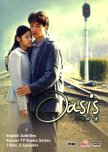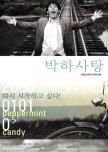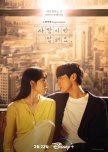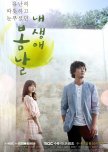Renseignements
- Dernière connexion: Il y a 10 heures
- Genre: Femme
- Lieu: unterwegs-im-koreanischen.de
- Contribution Points: 0 LV0
- Rôles:
- Date d'inscription: avril 20, 2022
- Awards Received:
 9
9  39
39  15
15
Listes récentes

unterwegsimkoreanischenD
unterwegs-im-koreanischen.deunterwegsimkoreanischenD
unterwegs-im-koreanischen.deAn-nyeong ha-se-yo!
I am here for KDramas and KMovies.
Maybe good to know for the German speaking visitors: I share my insights
in german language on my website unterwegs-im-koreanischenDE.
You´re welcome to visit anytime.
First, I can say that my ratings for Korean productions I have seen are in general rather generous (there are some that don´t appeal to me, but therefore they don´thave to be ´bad´, I am just not interested. I don´t evaluate those.
In general I highly value the performances and mostly multilayered approach to the stories. I could say I consider the KDrama a unique position feature. It is in general done quite well and performance is mostly superior. In fact, Korean dramas (and movies) for me not only offer a unique South Korean quality in story telling (which I highly appreciate!), but also a window to the nation´s particular culture/ society/ tradition/ politics/ language/ habits. (OK, my background is in psychology and journalism...)
Via KDramas and KMovies I discovered for myself the chance to comfortably and elegantly learn about Korean ways of life (which are here and there quite different to mine). This is also, where my reviews/ratings are coming from. Additionally, I often attach supplementary insight/research on the related topic or context of the story.
No wonder the chosen ones on my list are rather socially critical/insightful than on a personal love story/action/fun entertainment side.
And hey, I am an ahjumma by now - some topics have had their time, whereas others seem to be more relevant to me now...
--------------------------------------------------
If you want to know more,
here are just a few thoughts about where my respect for Korean productions is coming from:
1) SYMPATHY AND A CAPACITY TO SUFFER - ´HAN´
Whatching a KDrama, I would say you have be ready to sympathize not only with the protagonists, but also with their pain, go along with them, empathize, otherwise it's probably unbearable. The KDrama wants to touch and move. There is always plenty of room to explore the deeper emotional layers of the protagonists. Yet, the approach is not analytically objective, but instead always operates and explores with a fine sense for subtle emotional nuances. You have to like that. You have to accept that. An you should be ready to go with it. The pace is sometimes throttled, quite visually, for example, through scenes in slow motion or memories in the form of an (often repeated) review of scenes already seen. The magnifying glass and the spot and another spotlight are used to aim at it: Look closer! Feel it, too! Trace it within your own realm of experiences! KDrama is really good at THAT. If you generally don´t like that, many KDrama and KMovie productions are probably not recommendable for you.
You can find comparably enormous developments and dynamics within a character - just like in life... and between white and black you can find all kinds of shades. This makes empathy easier as the characters become human. But that also makes empathy more difficult... because sometimes you have to forgive something, reconcile with something, although you would rather not want to. The stories show us how it can work.
But why is this sometimes enormous capacity for suffering a prerequisite for 'enjoying' a KDrama ? Maybe it has to do with the Korean `Han` - a mostly painful emotion, yet not only the personal pain, but also that of the whole world. Some say 'Han' is very Korean, practically identity-forming. (For European standards it might be a bit comparable with the Andalusian Gitanos and their culture of Flamenco.) The pace of some movies and series, the heaviness and the pain that permeates everything, is an expression of this 'Han'.
Just remember: The people of the Korean pensinsula had to endure a lot over the centuries. Simply have a look at only the past century in Korean history: The Japanese protectorate and the abuse and oppression that came with it, World War II, North vs. South, the Korean War. In South Korea then followed military coup and dictatorship, the suppression of democratic aspirations with massacres of their own people, the arbitrary machinations of the Jaebeol, the Asian crisis, finally a still fragile little seed of democracy, however the President-elect 2017 sentenced to 22 years in prison for corruption - and being pardoned again (only recently in 12/2021). That´s quite a bit of turmoil. From a South Korean perspective sureley one can have an issue with justice/injustice, revenge and what they call ´makjang´ - it is always possible for things to turn out worse - this is a promise, KDrama Land can surely give!
2) EMPATHIZING WITH KEY HUMAN EMOTIONS AND THEIR SHADES: MAKJANG AND CARTHASIS
- the idea of Greek tragedy in Korean
However, this is where the greatest power of KDrama lies. It touches something primal human across cultures. In KDrama the keyboard of key human emotions are played up and down. One encounters love, hate and greed in all their varieties and compositions. Sometimes it's about an insatiable desire for money, sometimes for power, sometimes for success, sometimes for love, sometimes for recognition, sometimes for knowledge and information... Hate and revenge as well as the question of their legitimacy and morality are inevitably in the wake. The wheel of fate is started and turns inexorably. These key emotions act as a motor for the dynamics of human relationships, regardless of the cultural background. Same in South Korea. That wouldn't be specific. What is specific, on the other hand, is the perfection with which these key emotions are executed and want to touch something in the viewer: being able to empathize, sympathize. KDrama didn't invent that, but it's particularly good at it - maybe because it's a bit exaggerated and over-the-top.
This thesis might become understandable based on the catharsis in connection with the Greek tragedy. Perhaps the addictiveness of a KDrama stems from its cleansing, possibly emotionally liberating, effect. Because the characters in the plot play key human emotions up and down in a representative, fictitious and dramaturgically exaggerated manner, the viewers can channel, project and indirectly live out their own inner conflicts and feelings in the KDrama through mental and emotional involvement. Getting on the roller coaster of human feelings between greed, love, betrayal, hate and forgiveness and suffering, scolding, laughing, crying, empathizing with the emotional processes of the protagonists - that can have a liberating effect.
3) DETAILED NUANCES, SLOW MOTION, REPETITIONS ETC. ARE REINFORCING THE INTENISTY
Characteristic of the KDrama is the importance of the details, nuances, facial expressions, gestures and looks, which are staged in a special way. In addition to the acting power, pace and camera technique play an important role: including long shots, deliberate tracking shots, repeated playback of scenes, scenes in slow motion, focus on details, associative symbols, intervals (between inhaling and exhaling, between words and sentences... .) and intense close-ups, ... thus an extremely high intensity and atmospheric density is produced.
This opens up a greater variety of expression. Whether affection or dislike, whether tenderness, commitment and love or humiliation, rejection and oppression, the range is explored. In particular in the expression of intimacy, the Western-trained eye is reminded (by the KDrama) that moments of closeness can be lived in many ways - with emotional expression variants that may have been forgotten in the course of a strong eroticization of the media world.
So, to sum it all up, I could put it that way:
The KDrama demands a viewer´s own position. And due to the dramaturgy of the KDrama, this can never be one-dimensional. It has to differentiate itself over time. This I find truly remarkable. This is perhaps one of the greatest achievements in terms of KDrama's contribution to greater awareness. There are of course many international arthouse and independent films/series productions that are particularly ambitious in this regard. But these hardly reach as broad a mass as the KDrama.
Last but not least and maybe most important:
KDramas can strengthen and enhance a crucial primordial cross-cultural quality: COMPASSION.
Statistiques
239d 0h 54m
6d 15h 10m
Mises à jour des listes
-
 ComplétéIl y a 3 jours
ComplétéIl y a 3 jours -
 En cours de visionnageIl y a 23 jours
En cours de visionnageIl y a 23 jours -
 ComplétéIl y a 23 jours
ComplétéIl y a 23 jours -
 ComplétéIl y a 23 jours
ComplétéIl y a 23 jours -
 Compléténov. 28, 2024
Compléténov. 28, 2024 -
 Compléténov. 28, 2024
Compléténov. 28, 2024 -
 Compléténov. 28, 2024
Compléténov. 28, 2024 -
 Compléténov. 17, 2024
Compléténov. 17, 2024 -
 Compléténov. 17, 2024
Compléténov. 17, 2024
































